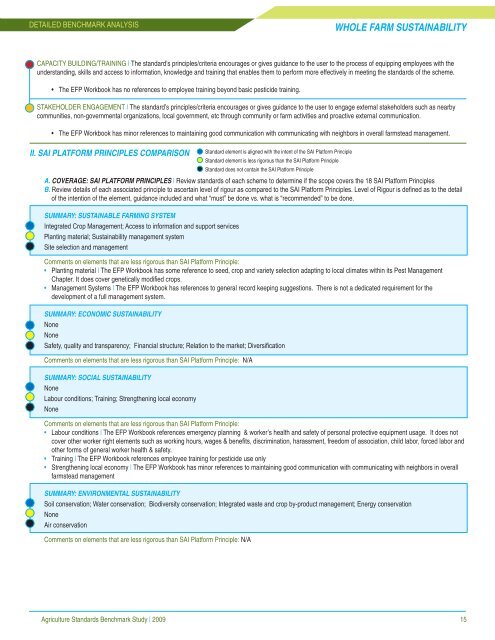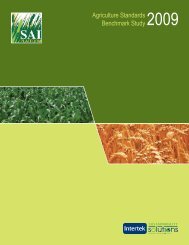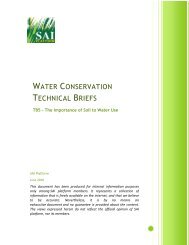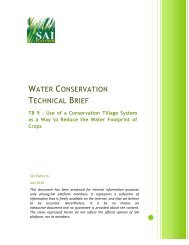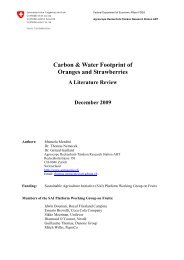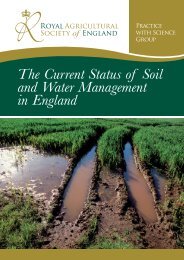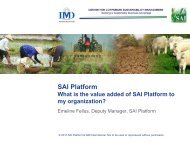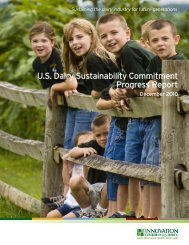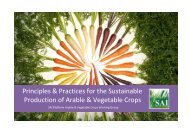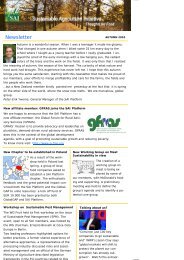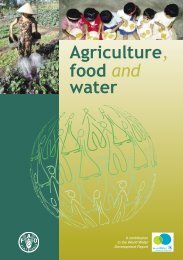DETAILED BENCHMARK ANALYSIS - SAI Platform
DETAILED BENCHMARK ANALYSIS - SAI Platform
DETAILED BENCHMARK ANALYSIS - SAI Platform
Create successful ePaper yourself
Turn your PDF publications into a flip-book with our unique Google optimized e-Paper software.
<strong>DETAILED</strong> <strong>BENCHMARK</strong> <strong>ANALYSIS</strong><br />
WHOLE FARM SUSTAINABILITY<br />
CAPACITY BUILDING/TRAINING | The standard’s principles/criteria encourages or gives guidance to the user to the process of equipping employees with the<br />
understanding, skills and access to information, knowledge and training that enables them to perform more effectively in meeting the standards of the scheme.<br />
• The EFP Workbook has no references to employee training beyond basic pesticide training.<br />
STAKEHOLDER ENGAGEMENT | The standard’s principles/criteria encourages or gives guidance to the user to engage external stakeholders such as nearby<br />
communities, non-governmental organizations, local government, etc through community or farm activities and proactive external communication.<br />
• The EFP Workbook has minor references to maintaining good communication with communicating with neighbors in overall farmstead management.<br />
II. <strong>SAI</strong> PLATFORM PRINCIPLES COMPARISON<br />
Standard element is aligned with the intent of the <strong>SAI</strong> <strong>Platform</strong> Principle<br />
Standard element is less rigorous than the <strong>SAI</strong> <strong>Platform</strong> Principle<br />
Standard does not contain the <strong>SAI</strong> <strong>Platform</strong> Principle<br />
A. COVERAGE: <strong>SAI</strong> PLATFORM PRINCIPLES | Review standards of each scheme to determine if the scope covers the 18 <strong>SAI</strong> <strong>Platform</strong> Principles<br />
B. Review details of each associated principle to ascertain level of rigour as compared to the <strong>SAI</strong> <strong>Platform</strong> Principles. Level of Rigour is defined as to the detail<br />
of the intention of the element, guidance included and what “must” be done vs. what is “recommended” to be done.<br />
SUMMARY: SUSTAINABLE FARMING SYSTEM<br />
Integrated Crop Management; Access to information and support services<br />
Planting material; Sustainability management system<br />
Site selection and management<br />
Comments on elements that are less rigorous than <strong>SAI</strong> <strong>Platform</strong> Principle:<br />
• Planting material | The EFP Workbook has some reference to seed, crop and variety selection adapting to local climates within its Pest Management<br />
Chapter. It does cover genetically modified crops.<br />
• Management Systems | The EFP Workbook has references to general record keeping suggestions. There is not a dedicated requirement for the<br />
development of a full management system.<br />
SUMMARY: ECONOMIC SUSTAINABILITY<br />
None<br />
None<br />
Safety, quality and transparency; Financial structure; Relation to the market; Diversification<br />
Comments on elements that are less rigorous than <strong>SAI</strong> <strong>Platform</strong> Principle: N/A<br />
SUMMARY: SOCIAL SUSTAINABILITY<br />
None<br />
Labour conditions; Training; Strengthening local economy<br />
None<br />
Comments on elements that are less rigorous than <strong>SAI</strong> <strong>Platform</strong> Principle:<br />
• Labour conditions | The EFP Workbook references emergency planning & worker’s health and safety of personal protective equipment usage. It does not<br />
cover other worker right elements such as working hours, wages & benefits, discrimination, harassment, freedom of association, child labor, forced labor and<br />
other forms of general worker health & safety.<br />
• Training | The EFP Workbook references employee training for pesticide use only<br />
• Strengthening local economy | The EFP Workbook has minor references to maintaining good communication with communicating with neighbors in overall<br />
farmstead management<br />
SUMMARY: ENVIRONMENTAL SUSTAINABILITY<br />
Soil conservation; Water conservation; Biodiversity conservation; Integrated waste and crop by-product management; Energy conservation<br />
None<br />
Air conservation<br />
Comments on elements that are less rigorous than <strong>SAI</strong> <strong>Platform</strong> Principle: N/A<br />
Agriculture Standards Benchmark Study | 2009<br />
15


